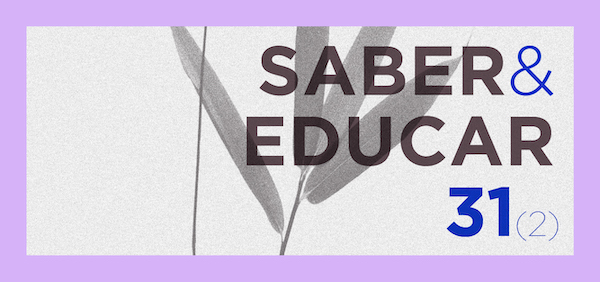Paulo Freire's political-pedagogical contribution in the training of educators in Cape Verde and its repercussions on educational policies
DOI:
https://doi.org/10.25767/se.v30i2.29369Keywords:
Paulo Freire, Cape Verde, adult education, education of educatorsAbstract
This text is the result of several communications in the preparation and celebration of Paulo Freire's Centenary in 2020 and 2021 and intends to share paulo freire's political-pedagogical contribution in the training of educators in Cape Verde and its repercussions on educational policies, based on my doctoral thesis in Education (Varela, 2018). An archipelagic, African and Sahelian country, Cape Verde is one of the rare countries that has developed an original adult education and training policy with remarkable continuity, a subsystem of out-of-school education, parallel and equivalent to the school subsystem, with a curriculum and a specific program, a career of educators integrated in the career of teaching staff and a system of recognition and certification. The work carried out that led to the thesis, it is proposed to contextualize historically the education of educators and analyze their results, using the case study, with an essentially descriptive character. With regard to Paulo Freire's political-pedagogical contribution, the results indicate that the training of educators had positive repercussions, namely on the development of knowledge for the exercise of the profession, in the democratization of access to education, in valuing the professional career of the Adult Educator and in the strengthening of the national educational system.
References
Arroyo, M. (2006). Formar educadoras e educadores de adultos. In Formação de educadores de adultos. Soares, Leôncio (org.). Autêntica/SECAD-MEC/UNESCO.
Cabo Verde (1979). Relatório do Seminário de Formação de Coordenadores Regionais de Alfabetização. Praia.
Cabral, A. (1974). Guiné-Bissau: nação africana forjada na luta. Nova Aurora.
Freire, P. & Macedo, D. (1990). Alfabetização: leitura do mundo, leitura da palavra. Rio de Janeiro: Paz e Terra.
Freire, P. (1985). Amílcar Cabral: o pedagogo da revolução. Palestra: 8 de novembro de 1985. Curso de Mestrado. Faculdade de Educação Universidade de Brasília (Não editado).
Freire, P. (1980). Paulo. Educação como prática da liberdade (11ª ed.). Paz e Terra.
Freire, P. (1978). Cartas à Guiné Bissau. Registros de uma experiência em processo (2ª ed.). Paz e Terra.
Gadotti, M. (2009). Moacir. Educação de Adultos como Direito Humano. Cadernos de Formação Nº 4. Editora e Livraria Instituto Paulo Freire.
Romão, J. & Gadotti, M. (2012) Paulo Freire e Amílcar Cabral. A descolonização das mentes. Editora e Livraria Instituto Paulo Freire.
Tavares, M. R. (2014). Formação de Professores e Trabalho Docente em Cabo Verde. Tese (Doutoramento em Educação: Currículo) Pontifícia Universidade Católica, São Paulo.
UNESCO (2014). Relatório Global sobre Aprendizagem e Educação de Adultos. Repensando a Alfabetização. UNESCO.
Varela, F. (2009). O legado de Paulo Freire e a sua contribuição para a formação político-pedagógico em Cabo Verde. In Jason Mafra… [et al.] (Org.), Globalização, Educação e Movimentos Sociais: 40 Anos de Pedagogia do Oprimido. Editora e Livraria Instituto Paulo Freire: Editora Esfera.
Varela, F. (2018). Concepções, trajetórias e práxis educativa: um estudo sobre o programa de formação de educadores de adultos em Cabo Verde. Tese (Doutoramento em Educação: Liderança Educacional). Universidade Aberta, Lisboa.
Downloads
Published
How to Cite
Issue
Section
License

This work is licensed under a Creative Commons Attribution-NonCommercial-NoDerivatives 4.0 International License.
- The opinions expressed by the authors are their exclusive responsibility.
- The journal reserves the right to make the original, normative changes, spelling and grammar, in order to maintain the standard language of worship, while respecting the style of the authors.
- Authors retain copyright and grant the journal right of first publication with the work simultaneously licensed under a Creative Commons Attribution License (BY-NC-SA 4.0) that allows others to share the work with an acknowledgement of the work's authorship and initial publication in this journal.
- Authors are able to enter into separate, additional contractual arrangements for the non-exclusive distribution of the journal's published version of the work (e.g., post it to an institutional repository or publish it in a book), with an acknowledgement of its initial publication in this journal.
- Authors are permitted and encouraged to post their work online (e.g., in institutional repositories or on their website) prior to and during the submission process, as it can lead to productive exchanges, as well as earlier and greater citation of published work (See The Effect of Open Access).
PRIVACY STATEMENT
The names and email addresses entered in this journal site will be used exclusively for the stated purposes of this journal and will not be made available for any other purpose or to any other party.






